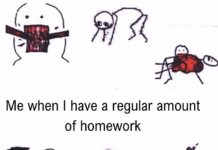Our View is a staff editorial produced collaboratively by The Rocket Staff. Any views expressed in the editorial are the opinions of the entire staff.
To review our editorial policy, which includes our blotter policy, click here.
This spring semester, the university will continue to offer 80% of its courses online, with the remaining classes being offered as hybrid class settings. Like last semester, the university calendar has been revised to remove extended breaks, including spring break.
As a mitigation measure, university administration eliminated fall break this past semester to avoid students traveling during an extended period. This essentially gave students only one mandated day off of classes: Labor Day. Students completed the semester before Thanksgiving, which normally provides a much-needed break to students before finals week.
For this semester, the Office of Student Engagement and Leadership will oversee Kickback Week and ask organizations on campus to limit meetings while providing activities for students to blow off some steam. While classes will still be held, faculty have been encouraged to lighten their course load the week of March 7.
Unfortunately, we will endure another semester without a mandated break in the university calendar. However, if we want a change for the fall semester, we must be vocal about our concerns now.
The longer the pandemic goes on, the more fatigue will grow in all aspects of our lives as students. The potential for campus-wide burnout is high, even with the positive outlook of a semester that will end in late April. If we have a third semester with a lack of multiple days off, we will run into the same issue of creating a semester symbolic of an academic and mental marathon.
It’s time to pay more attention to the mental health and wellness of students who are simply trying their best, and we believe the lack of a break, or even multiple days off spread throughout the semester, is a missed opportunity to do so.
We want to commend and thank student resources on campus, especially the counseling center and student support, for their efforts in serving students, and encourage students to use these resources as these offices are crucial in supporting students and combatting the national mental health crisis among our age group.
We also need to ensure that faculty receive some sort of break for all of their efforts for students and the community, especially since last March. These breaks are also beneficial to faculty members who also experience fatigue and burnout, especially while transferring classes to online platforms. The ultimate quality of education can become run down when our educators aren’t given time to breathe and catch up, similar to students.
We absolutely understand the university’s reasoning for eliminating breaks and limiting travel as much as possible. However, the university should look at how other universities have handled spring breaks to see if different types of breaks benefit student and faculty mental health and morale while protecting them from the virus. With Indiana Univerisity of Pennsylvania (IUP) and Lock Haven University being two universities in the Pennsylvania State System of Higher Education scheduling non-class days throughout the semester, we hope that SRU watches the effectiveness of these models closely in determining the schedule for next semester.
While we may not be able to change how our semester calendar looks like this semester, our concerns now will help the university administration determine what the upcoming fall semester will look like, especially as the university prepares for a more on-campus presence.







